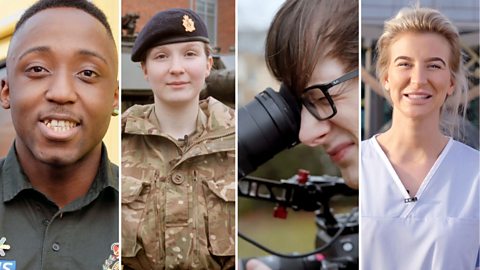There are lots of options to get into teaching, and lots of variety once you're there! The biggest initial decision is picking which age group you'd like to teach: early years (children up to the age of 5), primary (ages 5-11), secondary (ages 11-18), or further education (e.g. colleges or sixth forms).
Newly Qualified Teachers (NQTs) have an induction period in which they get extra support to settle into the role. From September 2021, this period will increase from one year (three school terms) to two years (six school terms), so there will be more time to get to grips with life in the classroom.
Scroll down to hear from young people working in teaching and find out how you could follow in their footsteps.

Stacey is a teaching assistant in a primary school.
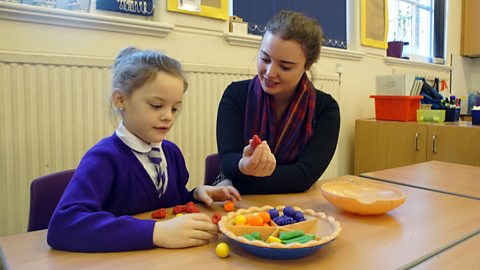
Teaching assistant Stacey works with 5-11-year-olds. Teaching assistants (TAs) support teachers with classroom activities such as helping children with reading and writing. From a TA role, you could choose to train to become a teacher.
Working with children is challenging, but it is a job that you go home and think: 'I made a difference today.'

Toby: primary school teacher. video
Toby is a primary school teacher, teaching 5-7-year-olds.
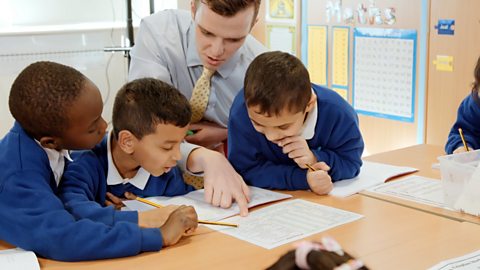
Primary school teacher Toby trained via Teach First, a programme which offers the opportunity to teach for two years while earning a Postgraduate Diploma in Education and Leadership (PGDE).
We try to build our children to be fully formed human beings… to be able to interact with the rest of society in a positive way.

Dina: secondary Maths teacher. video
Dina teaches Maths to 11-18-year-olds.
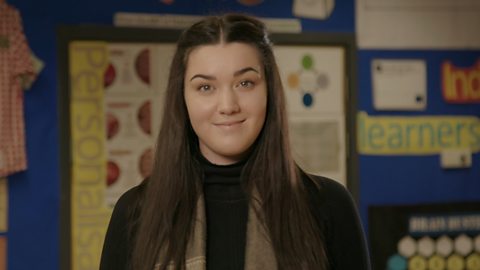
Secondary school teacher Dina did a one-year PGCE (Postgraduate Certificate in Education (PGCE)) after her Maths degree to qualify as a teacher. Half of her PGCE was a placement in a school and the second half of the year was spent in university.
Being a young teacher means children relate to me more and I can to them!

Alice Fevronia: Geography teacher. video
Best know as the runner-up Great British Bake Off 2019, Alice is also a Geography teacher at an all-boys school.
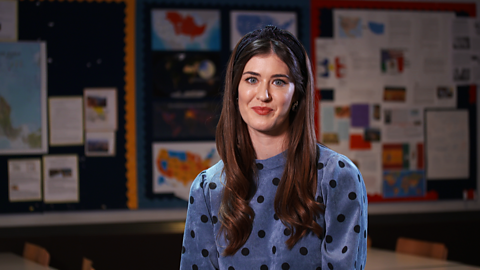
Geography teacher Alice qualified as a teacher by doing a Postgraduate Certificate in Education (PGCE) after her Geography degree. She wasn't always sure what sort of job she wanted to do so just pursued subjects she enjoyed, which led her to a career she loves.
You don't have to be an extrovert to be teacher!

Annabel: German teacher. video
Annabel teaches German in a secondary school.
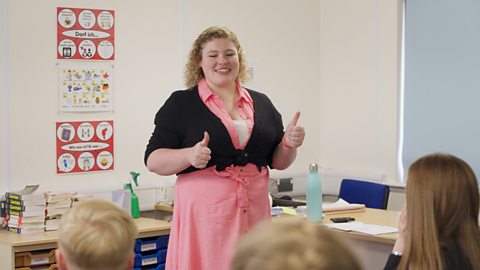
German teacher Alice qualified as a teacher by doing a Postgraduate Certificate in Education (PGCE) after her German and Linguistics degree. When she was a child, she went to Germany on holiday with her mum and it gave her that extra motivation to learn it.
Don't give up too easily your language learning. You never know where it will take you!

What to expect if you want to become a teacher
- Teacher average salary: ÂŁ25,714 to ÂŁ41,604 per year
- Teacher typical working hours: 37 to 45 hours per week
What qualifications do you need to be a teacher?
Typical entry requirements:
Undergraduate degree: You could get into this role by doing an undergraduate degree that leads to qualified teacher status (QTS), such as a Bachelor of Education (BEd). You'll usually need GCSEs (or equivalent) at grades 9 to 4 (A* to C), including Maths, English and Science and two to three A-levels or equivalent for a degree
Postgraduate study/training: If you have a degree in a curriculum subject without QTS, you can qualify as a teacher by completing a postgraduate teacher training course at university or on a school-based training programme
Apprenticeship: You can also get into this career through a teacher higher apprenticeship, if you have a relevant degree. You'll usually need GCSEs (or equivalent) at grades 9 to 4 (A* to C), including Maths, English and Science, and a degree in a relevant subject
Work: You could also work towards this career by starting as a teaching assistant and doing a part-time degree. You could then move onto a postgraduate teaching course to get qualified teacher status.
Source: LMI for All, National Careers Service
This information is a guide and is constantly changing. Please check the website for the latest information and all the qualifications needed.
Learn more about on the Get Into Teaching website.
For careers advice in all parts of the UK visit: , , and .


Find work experience placements with Workfinder.
Tips and advice
Help with interviews, writing a CV and all things work experience related.


Careers in education
Find out what you could expect from a role in the education sector.

Careers A to Z: Find your perfect job
From actor to zoologist, find the right fit for you.

More from Bitesize Careers
Hear from young people about the world of work.
